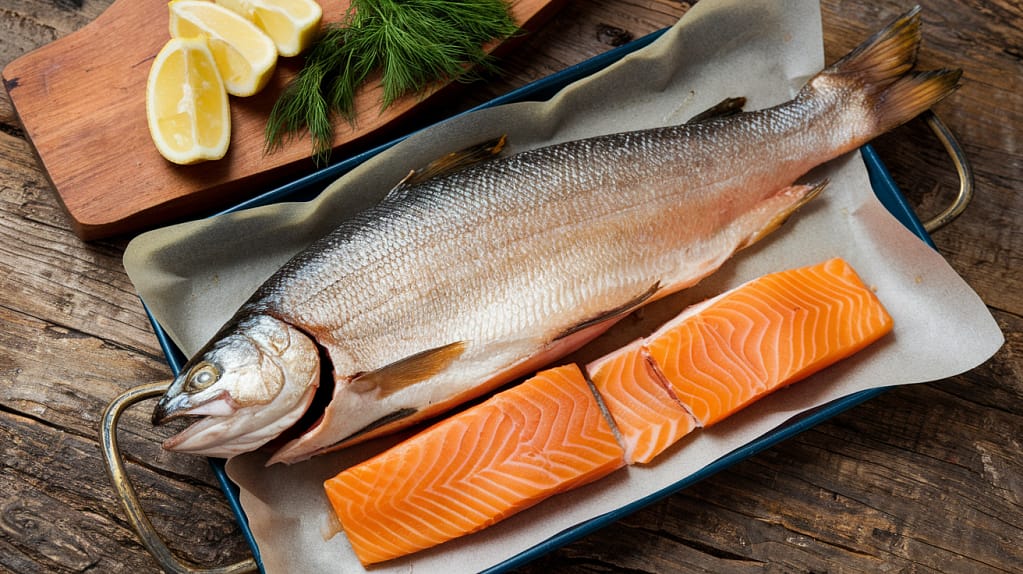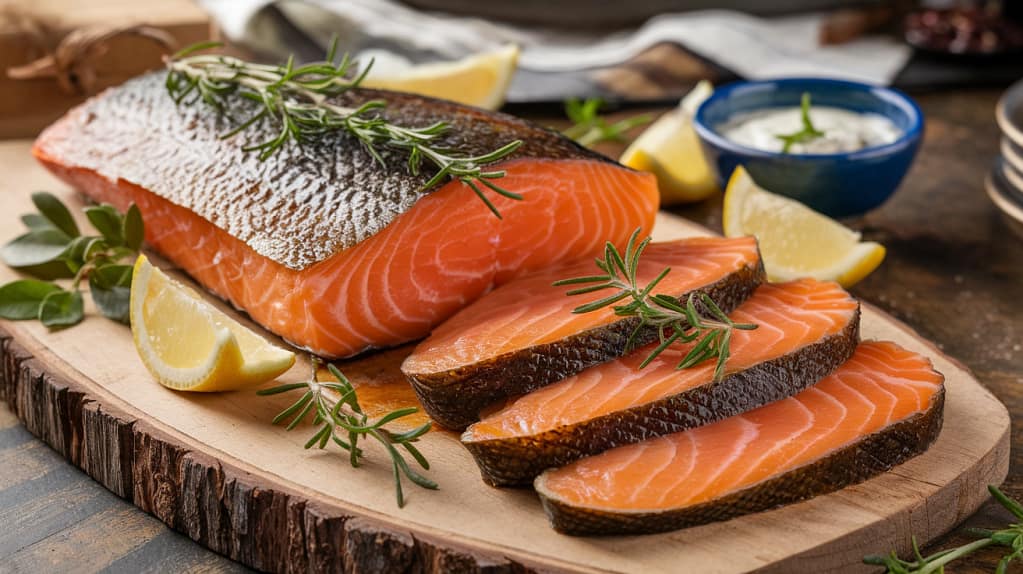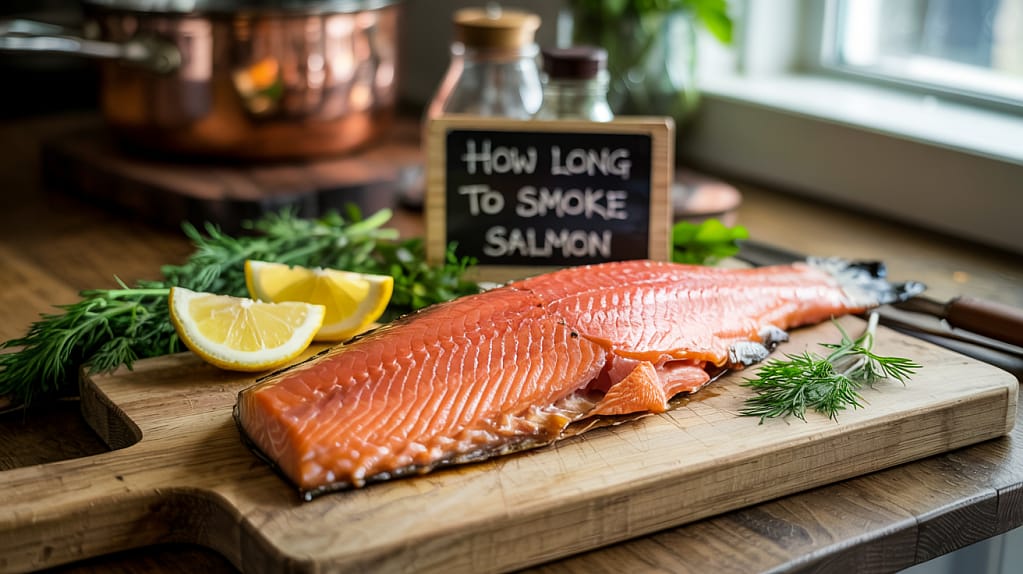How Long to Smoke Salmon: A Complete Guide
Have you ever bitten into a perfectly smoked salmon and wondered how such complex flavors could emerge from a simple fish? The transformation from raw fish to delicately smoked delicacy isn’t just cooking—it’s alchemy. The question of how long to smoke salmon isn’t merely about time, but about understanding a process that humans have perfected over thousands of years.
The ancient Nordic and Indigenous Pacific Northwest populations considered smoking fish not just preservation, but art. Today, we’ll demystify this process, exploring everything from creating the perfect smoked salmon brine to determining precisely what temperature for smoked salmon yields that melt-in-your-mouth texture home chefs dream about.
The Science Behind the Perfect Brine
Before addressing how do you smoke salmon, we must understand the foundation: the brine. A smoked fish brine isn’t just saltwater—it’s a carefully balanced solution that prepares the fish for its smoky transformation.
The Essential Brine Formula
For a basic yet effective brine that enhances without overwhelming:

- 4 cups cold water
- ⅓ cup kosher salt (not table salt—the iodine affects flavor)
- ¼ cup natural sugar (brown, maple, or honey)
- 2 tablespoons whole peppercorns
- 3-4 bay leaves
- 2 sprigs fresh dill
- Zest from one unwaxed lemon
The salt-to-water ratio is crucial—too much salt leads to an inedible product, while too little fails to draw out moisture and develop the signature texture. The sugar balances harshness and contributes to the appealing mahogany color during smoking.
Brine Chemistry: Why It Matters
When creating a smoked salmon brine, you’re initiating a complex osmotic process. The salt causes proteins to denature and water to move out of the fish cells while bringing flavoring elements in. This exchange creates the perfect environment for smoke adherence and flavor development.
Unlike many recipes that suggest overnight brining without explanation, the optimal brining time depends on thickness:
- Thin fillets (under ½ inch): 4-6 hours
- Medium fillets (½-1 inch): 6-8 hours
- Thick fillets (over 1 inch): 8-12 hours
Over-brining is the most common mistake in salmon smoking, resulting in an overly salty product that masks the delicate fish flavor.
Time and Temperature: The Critical Variables
Finding the Sweet Spot: Temperature Control
The debate about what temperature for smoked salmon produces optimal results has raged among smoking enthusiasts for generations. After extensive testing, I’ve found these ranges work best:
- Preparation Phase: 120-140°F (49-60°C) for the first 1-2 hours
- Cooking Phase: 175-225°F (79-107°C) until completion
This two-stage approach allows the smoke flavor to penetrate deeply during the lower-temperature initial phase before the heat increases to complete the cooking process.
The Timeline: How Long to Smoke Salmon Properly
When considering how long to smoke salmon, remember that thickness, starting temperature, and desired doneness all play crucial roles. As a general framework:
- Pellicle Formation: 1-3 hours air-drying after brining
- Initial Smoking Phase: 1-2 hours at lower temperature
- Cooking Phase: 1-4 hours at higher temperature
The total process typically requires 3-6 hours of actual smoking time, with the salmon complete when it reaches an internal temperature of 145°F (63°C) for food safety. The flesh should flake easily but remain moist.
For those seeking a softer, lox-like texture, aim for the lower end of the temperature range and remove when the internal temperature reaches 140°F (60°C), acknowledging this is slightly below FDA recommendations.
The Process: From Raw to Remarkable
Selecting Your Salmon
Before addressing how do you smoke salmon, start with the right fish:
- Choose fresh over frozen when possible
- Look for vibrant color and firm flesh
- Wild-caught offers more flavor but requires careful monitoring due to lower fat content
- King (Chinook) and Sockeye salmon provide excellent fat content for smoking
- Farm-raised Atlantic salmon works well for beginners due to consistent fat distribution
Preparing the Salmon
- Remove pin bones using fish tweezers
- Leave skin on to hold the flesh together during smoking
- Trim the thin belly portion for even thickness
- Cut large fillets into manageable 8-10 inch sections
The Brining Process
- Combine all brine ingredients in a non-reactive container
- Submerge salmon completely, using weights if necessary
- Refrigerate for appropriate time based on thickness
- Remove and rinse thoroughly under cold running water
- Pat dry with paper towels
The Critical Pellicle
After brining but before smoking comes a step many recipes mysteriously omit: pellicle formation. This sticky protein layer that develops on the surface is essential for smoke adhesion and texture development.
Place rinsed salmon on a rack, skin-side down, in a cool place with good airflow (or in front of a fan on low setting) for 1-3 hours until the surface feels tacky but not wet. A properly formed pellicle looks slightly shiny.
The Smoking Method Revealed
Now to finally address how do you smoke salmon:
- Prepare your smoker: Whether using electric, propane, or charcoal, preheat to 120-140°F (49-60°C).
- Choose wood wisely: Alder is traditional, but apple, cherry, or maple provide excellent results. Avoid mesquite or hickory, which overpower the delicate salmon flavor.
- Position properly: Place salmon skin-side down on oiled racks with space between pieces for smoke circulation.
- Begin with patience: Smoke at the lower temperature range for 1-2 hours to allow maximum smoke penetration before protein structures tighten.
- Raise the heat: Increase to 175-225°F (79-107°C) to complete the cooking process.
- Monitor moisture: Place a pan of water in the smoker to maintain humidity and prevent drying.
- Check temperature: Use a digital thermometer inserted into the thickest part to verify doneness at 145°F (63°C).
- Rest before serving: Allow 30 minutes at room temperature for juices to redistribute.

Troubleshooting Common Challenges
When Things Go Wrong
Even experienced smokers encounter issues. Here’s how to address common problems:
- Too salty: Reduce brining time or salt concentration; in emergency cases, soak overly salty smoked salmon in cold water for 1 hour
- Too dry: Lower smoking temperature and add water pan to smoker
- Not enough smoke flavor: Use smaller wood chips, increase initial low-temperature phase
- White residue on surface: This is albumin protein and indicates smoking temperature was too high too quickly
Beyond the Basics: Creative Variations
Alternative Brine Additions
Experiment with these additions to your smoked fish brine:
- 2 tablespoons bourbon or whiskey
- 1 tablespoon crushed juniper berries
- 2 teaspoons whole coriander seeds
- 3 crushed cardamom pods
- 2 tablespoons maple syrup (reduce sugar accordingly)
- 1 tablespoon soy sauce and 1 teaspoon ginger (for Asian influence)
Serving Your Masterpiece
The traditional accompaniments of capers, red onion, and cream cheese are just the beginning. Consider:
- Flaked into scrambled eggs with fresh herbs
- Tossed with pasta, lemon cream sauce, and fresh peas
- Added to potato hash with dill and a poached egg
- Blended with cream cheese, horseradish, and lemon for a spectacular spread
- Layered on cucumber rounds with wasabi cream for appetizers
Storage and Food Safety
Properly smoked salmon will keep:
- Refrigerated: 5-7 days (tightly wrapped)
- Frozen: Up to 3 months (vacuum-sealed)
Always bring refrigerated smoked salmon to room temperature before serving to maximize flavor.

Conclusion: The Journey to Perfect Smoked Salmon
Mastering how long to smoke salmon and understanding the perfect smoked fish brine requires patience and practice. The journey from selecting the right fish to finding what temperature for smoked salmon produces your personal perfect result is both scientific and deeply personal.
The method outlined here provides a foundation, but don’t be afraid to experiment and develop your signature approach. Each smoking session teaches something new, and soon you’ll develop an intuition that goes beyond recipes and timers.
Remember that smoking salmon isn’t just cooking—it’s participating in a culinary tradition that spans cultures and millennia. Embrace the process, respect the ingredient, and enjoy the remarkable transformation that occurs when salmon meets smoke.
Final Quick Reference Guide
| Aspect | Recommendation |
|---|---|
| Brine Time | 4-12 hours depending on thickness |
| Pellicle Formation | 1-3 hours air-drying |
| Initial Smoking Temperature | 120-140°F (49-60°C) |
| Final Smoking Temperature | 175-225°F (79-107°C) |
| Total Smoking Time | 3-6 hours |
| Target Internal Temperature | 145°F (63°C) |
| Best Woods | Alder, apple, cherry, maple |
| Storage Time (Refrigerated) | 5-7 days |







